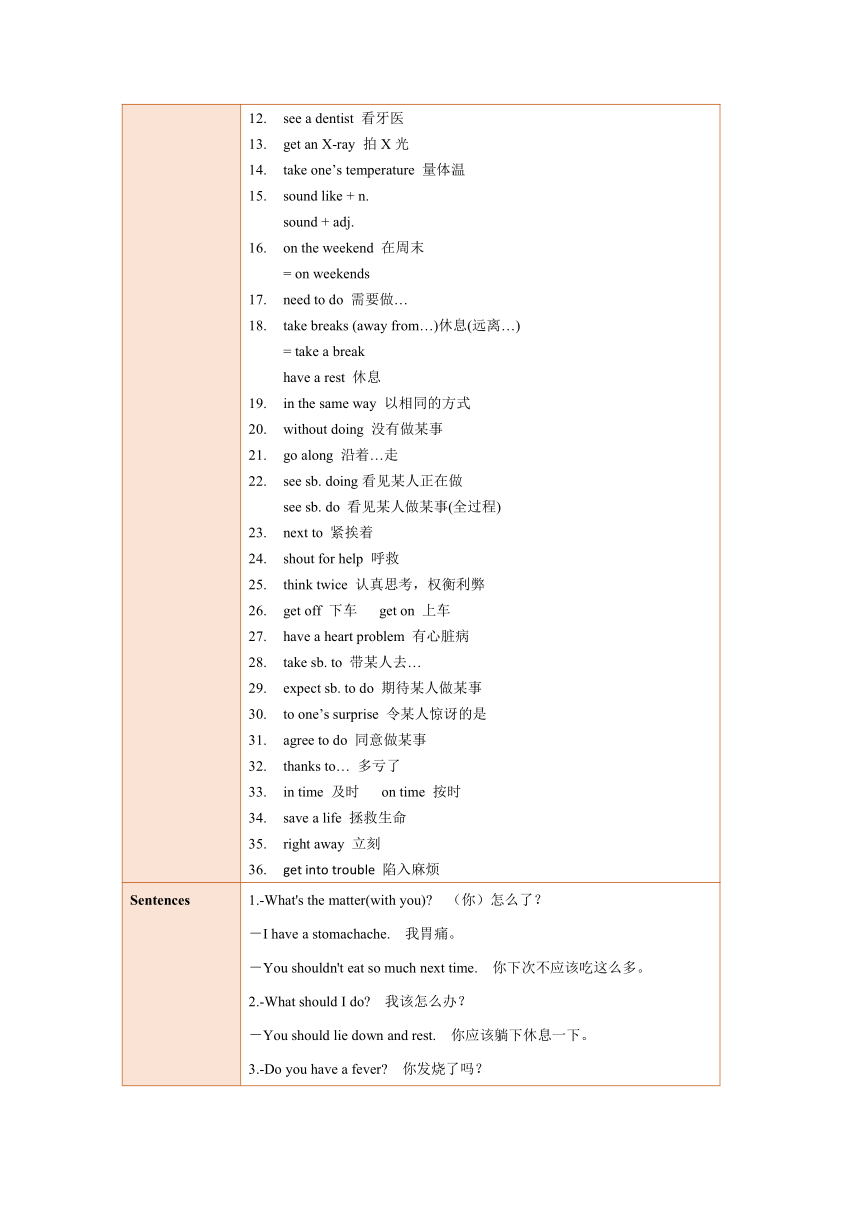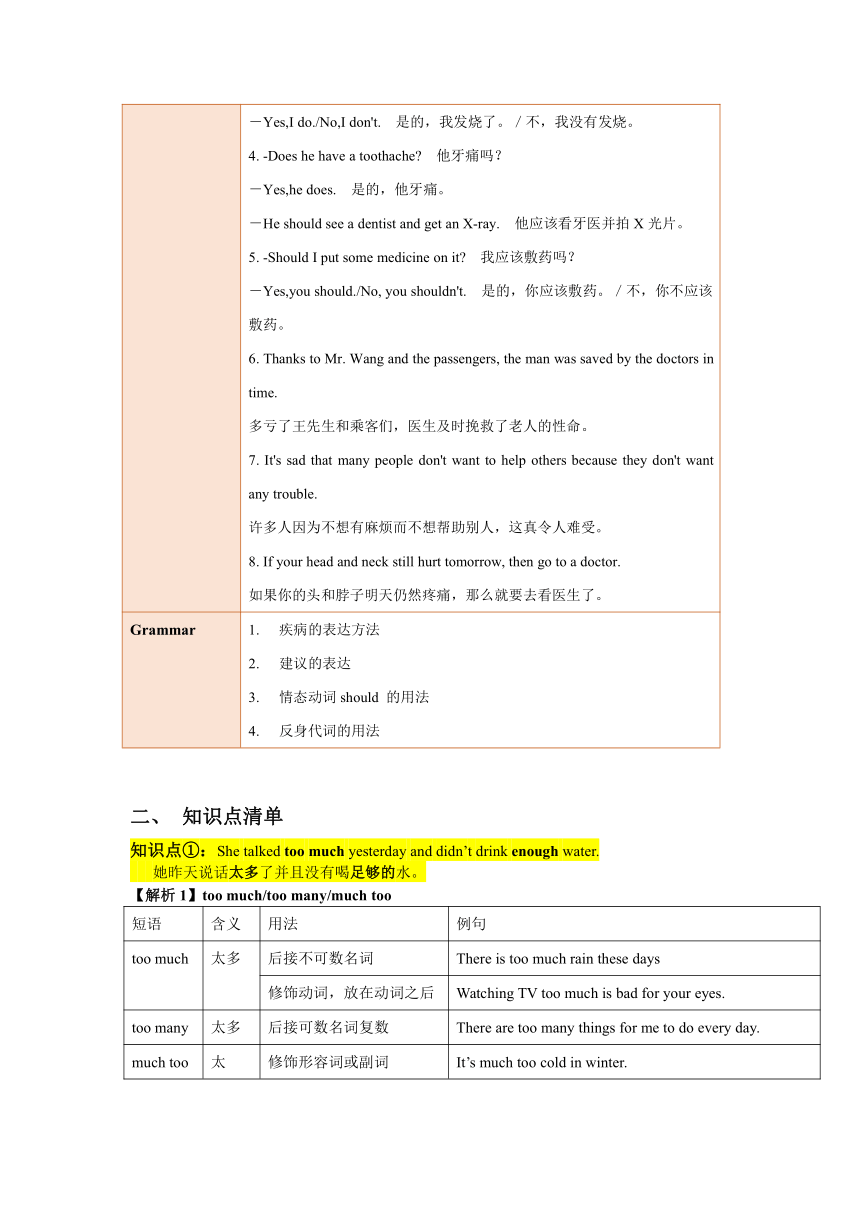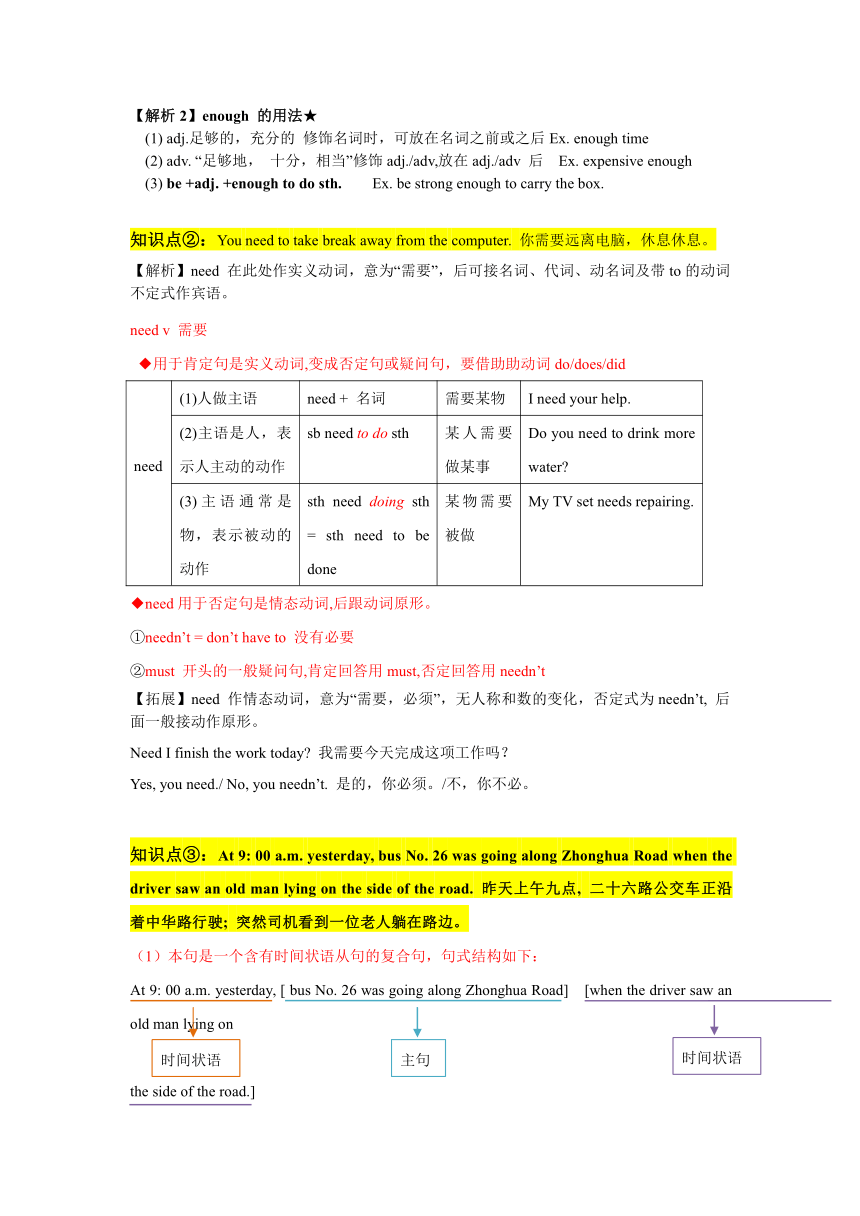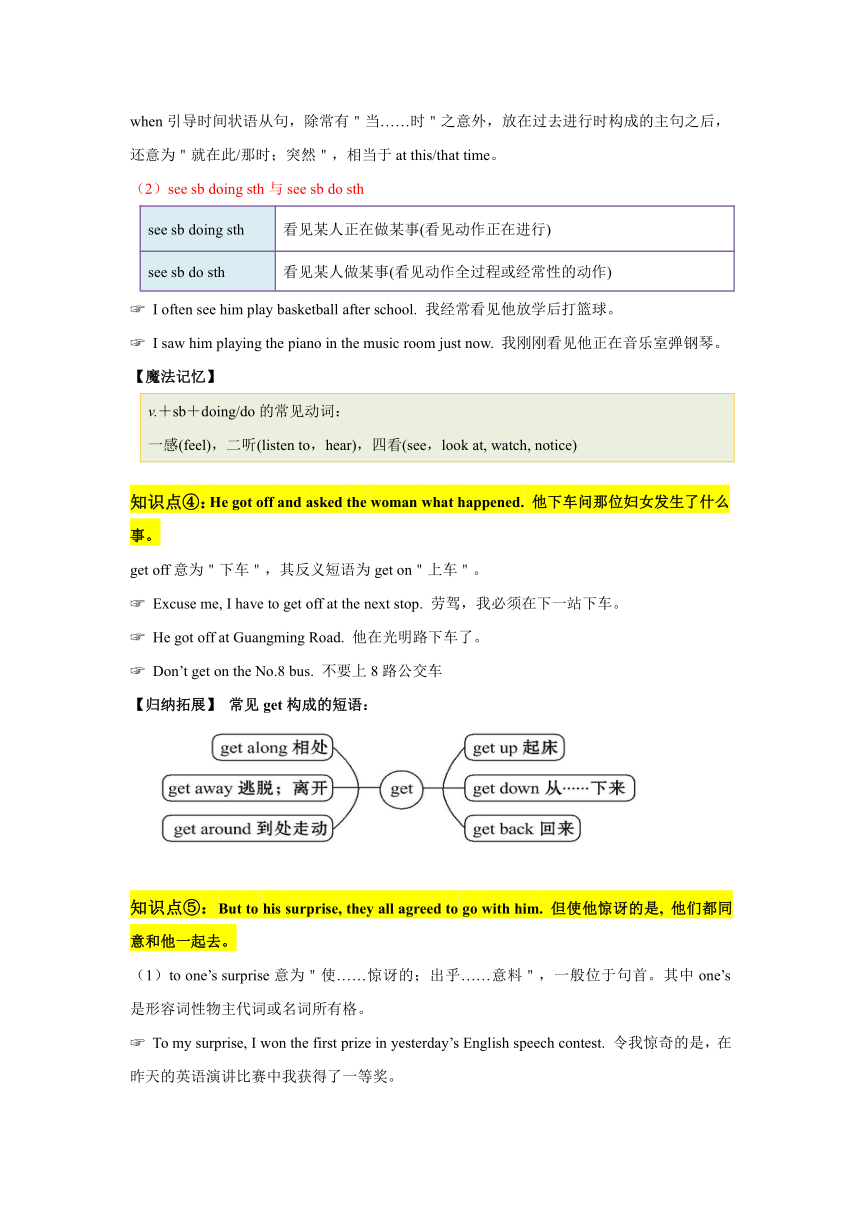Unit 1 What’s the matter?Section A 知识清单学案
文档属性
| 名称 | Unit 1 What’s the matter?Section A 知识清单学案 |

|
|
| 格式 | docx | ||
| 文件大小 | 174.4KB | ||
| 资源类型 | 教案 | ||
| 版本资源 | 人教新目标(Go for it)版 | ||
| 科目 | 英语 | ||
| 更新时间 | 2024-03-12 00:00:00 | ||
图片预览





文档简介
Unit 1 What’s the matter?Section A
单元知识清单
基础知识清单
Words 1.stomach n.胃:腹部 2.neck n.颈:脖子 3.throat n.咽喉;喉咙 4.fever n.发烧 5.cough n. 咳嗽 6.break n.间歇;休息/v.打破 7.trouble n. 问题;苦恼 8.sore adj .疼痛的,酸痛的 9.passenger n.乘客;旅客 10. headache n.头痛 11. stomachache n. 胃痛:腹痛 12. toothache n.牙痛 13. hurt v.(使)疼痛;受伤--hurt (pt.)--hurt (pp.) 14. lie v .躺--lay(pt .)-- lain(pp.) --lying (现在分词) 15. advice n.建议--advise v.建议
Phrases What’s the matter (with you) 怎么了?出什么事了? = What’s the trouble (with…) = What’s the problem (with…) = What’s wrong (with…) have a cold 感冒 catch a cold 感冒 have the flu 得了流感 have a stomachache 肚子疼 have a sore back 背疼 have a sore throat 嗓子疼 have a fever 发烧= have a temperature have a cough 咳嗽 have a toothache 牙疼 have a headache 头疼 lie down 躺下(lie – lay – lain) see a dentist 看牙医 get an X-ray 拍X光 take one’s temperature 量体温 sound like + n. sound + adj. on the weekend 在周末 = on weekends need to do 需要做… take breaks (away from…)休息(远离…) = take a break have a rest 休息 in the same way 以相同的方式 without doing 没有做某事 go along 沿着…走 see sb. doing看见某人正在做 see sb. do 看见某人做某事(全过程) next to 紧挨着 shout for help 呼救 think twice 认真思考,权衡利弊 get off 下车 get on 上车 have a heart problem 有心脏病 take sb. to 带某人去… expect sb. to do 期待某人做某事 to one’s surprise 令某人惊讶的是 agree to do 同意做某事 thanks to… 多亏了 in time 及时 on time 按时 save a life 拯救生命 right away 立刻 get into trouble 陷入麻烦
Sentences 1.-What's the matter(with you) (你)怎么了? -I have a stomachache. 我胃痛。 -You shouldn't eat so much next time. 你下次不应该吃这么多。 2.-What should I do 我该怎么办? -You should lie down and rest. 你应该躺下休息一下。 3.-Do you have a fever 你发烧了吗? -Yes,I do./No,I don't. 是的,我发烧了。/不,我没有发烧。 4. -Does he have a toothache 他牙痛吗? -Yes,he does. 是的,他牙痛。 -He should see a dentist and get an X-ray. 他应该看牙医并拍X光片。 5. -Should I put some medicine on it 我应该敷药吗? -Yes,you should./No, you shouldn't. 是的,你应该敷药。/不,你不应该敷药。 6. Thanks to Mr. Wang and the passengers, the man was saved by the doctors in time. 多亏了王先生和乘客们,医生及时挽救了老人的性命。 7. It's sad that many people don't want to help others because they don't want any trouble. 许多人因为不想有麻烦而不想帮助别人,这真令人难受。 8. If your head and neck still hurt tomorrow, then go to a doctor. 如果你的头和脖子明天仍然疼痛,那么就要去看医生了。
Grammar 1. 疾病的表达方法 2. 建议的表达 3. 情态动词should 的用法 4. 反身代词的用法
知识点清单
知识点①:She talked too much yesterday and didn’t drink enough water.
她昨天说话太多了并且没有喝足够的水。
【解析1】too much/too many/much too
短语 含义 用法 例句
too much 太多 后接不可数名词 There is too much rain these days
修饰动词,放在动词之后 Watching TV too much is bad for your eyes.
too many 太多 后接可数名词复数 There are too many things for me to do every day.
much too 太 修饰形容词或副词 It’s much too cold in winter.
【解析2】enough 的用法★
(1) adj.足够的,充分的 修饰名词时,可放在名词之前或之后Ex. enough time
(2) adv. “足够地, 十分,相当”修饰adj./adv,放在adj./adv 后 Ex. expensive enough
(3) be +adj. +enough to do sth. Ex. be strong enough to carry the box.
知识点②:You need to take break away from the computer. 你需要远离电脑,休息休息。
【解析】need 在此处作实义动词,意为“需要”,后可接名词、代词、动名词及带to的动词不定式作宾语。
need v 需要
◆用于肯定句是实义动词,变成否定句或疑问句,要借助助动词do/does/did
need (1)人做主语 need + 名词 需要某物 I need your help.
(2)主语是人,表示人主动的动作 sb need to do sth 某人需要做某事 Do you need to drink more water
(3)主语通常是物,表示被动的动作 sth need doing sth = sth need to be done 某物需要被做 My TV set needs repairing.
◆need用于否定句是情态动词,后跟动词原形。
①needn’t = don’t have to 没有必要
②must 开头的一般疑问句,肯定回答用must,否定回答用needn’t
【拓展】need 作情态动词,意为“需要,必须”,无人称和数的变化,否定式为needn’t, 后面一般接动作原形。
Need I finish the work today 我需要今天完成这项工作吗?
Yes, you need./ No, you needn’t. 是的,你必须。/不,你不必。
知识点③:At 9: 00 a.m. yesterday, bus No. 26 was going along Zhonghua Road when the driver saw an old man lying on the side of the road. 昨天上午九点, 二十六路公交车正沿着中华路行驶; 突然司机看到一位老人躺在路边。
(1)本句是一个含有时间状语从句的复合句,句式结构如下:
At 9: 00 a.m. yesterday, [ bus No. 26 was going along Zhonghua Road] [when the driver saw an old man lying on
the side of the road.]
when引导时间状语从句,除常有"当……时"之意外,放在过去进行时构成的主句之后,还意为"就在此/那时;突然",相当于at this/that time。
(2)see sb doing sth与see sb do sth
see sb doing sth 看见某人正在做某事(看见动作正在进行)
see sb do sth 看见某人做某事(看见动作全过程或经常性的动作)
I often see him play basketball after school. 我经常看见他放学后打篮球。
I saw him playing the piano in the music room just now. 我刚刚看见他正在音乐室弹钢琴。
【魔法记忆】
v.+sb+doing/do的常见动词: 一感(feel),二听(listen to,hear),四看(see,look at, watch, notice)
知识点④:He got off and asked the woman what happened. 他下车问那位妇女发生了什么事。
get off意为"下车",其反义短语为get on"上车"。
Excuse me, I have to get off at the next stop. 劳驾,我必须在下一站下车。
He got off at Guangming Road. 他在光明路下车了。
Don’t get on the No.8 bus. 不要上8路公交车
【归纳拓展】 常见get构成的短语:
知识点⑤:But to his surprise, they all agreed to go with him. 但使他惊讶的是, 他们都同意和他一起去。
(1)to one’s surprise意为"使……惊讶的;出乎……意料",一般位于句首。其中one’s是形容词性物主代词或名词所有格。
To my surprise, I won the first prize in yesterday’s English speech contest. 令我惊奇的是,在昨天的英语演讲比赛中我获得了一等奖。
To his surprise, the plan succeeded. 让他吃惊的是,那个计划成功了。
【知识拓展】
surprise 动词 surprise sb
surprise 名词 to one’s surprise,give sb a surprise,in surprise
surprising 形容词 常修饰物
surprised 形容词 be surprised at sth 常用人作主语 be surprised to do sth be surprised that
surprisingly 副词
I don’t want to surprise her. 我不想让她惊讶。
Let’s give Mom a surprise! 咱们给妈妈一个惊喜吧!
What surprising news! 多么令人惊讶的消息呀!
I was surprised at the news. 我对这个消息感到意外。
She looked surprisingly well. 她看上去身体出奇地好。
(2)agree意为"同意",作动词。常用结构:agree to do sth意为"同意做某事"。
I agree to help Mary with her Chinese. 我同意帮助玛丽学习汉语。
知识点⑥:He expected most or all of the passengers to get off and wait for the next bus.
他期待大部分或所有乘客下车去等待下一辆公交车。
(1) expect to do sth 预计做某事
(2) expect sb. to do sth 期待某人做某事= look forward to doing sth 期待做某事
(3)I expect so/not 我期待是这样/不是这样
知识点⑦:Thanks to Mr. Wang and the passengers, the doctors saved the man in time.
多亏王先生和乘客们,医生及时挽救了那位老人。
(1) thanks to…多亏…,由于…
短语 含义 用法
Thanks to “由于”、“多亏” to表示感谢的对象, thanks不可以改为thank you,to后也不接动词原形
Thanks for “因……而感谢” for强调为何而感谢,其后可接名词或 v-ing thanks相当于 thank you
【记】 Thanks to Tom, I wasn’t late this morning, so thanks again for Tom’s help.
【拓展】thanks for…为…而感谢…
Thanks for you kindness.感谢你的善良。
【考点分析2】on time 准时/in time 及时
on time = at exactly the right time. 准时(在规定的时间之内) 强调与某个时刻一致
in time = with enough time to spare/ not late 及时(恰在时间点上) 表示动作在规定时间内或比规定时间提前发生
【记】She didn’t catch the ___________, so she couldn’t arrive there __________.
【拓展】与time相关的短语:
at times=sometimes 有时 have a good time 玩得高兴
have time =be free 有空 all the time 一直
at the same time 同时 by the time 到……时候
for the first time 第一次
【句型】 It’s time to do sth =It’s time for sth 是该做某事的时间了
It takes sb. some time to do sth 做某事花费某人多长时间s
知识点⑧:Thanks to Mr. Wang and the passengers, the doctors saved the man in time.
lie v. 躺,平躺
lie的各种含义
lie v. 躺,位于,平放 lay—lain—lying You should lie down. 你应该躺下。 His school lies in the north of the city. 他的学校位于城北。
lie v. 说谎 lied—lied—lying He often lies. 他经常说谎。
lie n. 谎言 lies(复数) He often tells lies. 他经常说谎。
【巧学妙记】
lie的用法口诀 规则是说谎(lie lied lied), 不规则是躺(lie lay lain)。
【拓展】
lay v. 下蛋,放置
The hens lay a lot of eggs every day. 母鸡每天下很多蛋。
Please lay the table before dinner. 饭前请摆好餐具。
知识点⑨:Thanks to Mr. Wang and the passengers, the doctors saved the man in time.
without prep. 没有,缺乏
(1)without后接名词、代词宾格或v-ing作宾语,其反义词为with。
We got there without any trouble. 我们到了那儿,一路上没遇到任何麻烦。
Can you finish your homework without him 没有他你能完成你的家庭作业吗?
She left the room without saying a word. 她一句话没有说就离开了房间。
(2)without用于否定句,还可以表示条件,意为"如果没有",相当于if引导的否定条件句。
We couldn’t live without air.
=We couldn’t live if there weren’t air.
如果没有空气,我们就不能活。
知识点10:I think I sat① in the same way for too long ②without moving.(2d)
我想我保持同样的坐姿太久了而没有动。
【考点分析1】in the same way以同样的方式
【拓展】与way 相关的短语
all the way 一路上 by way of 经由,通过 …… 方式
in no way 决不 get in the way 挡道
by the way 顺便提一下,另外 in one's / the way 妨碍,阻碍
in a way 在某点,在某种程度上 in this way 用这种方法
lead the way 带路,引路 lose one's way 迷路
on the / one's way (to) 在去……的路上
【考点分析2】without prep 没有;缺乏(反)with (后跟Ving)
without doing sth.没有做某事
语法清单
语法①:疾病的表达方式
疾病的询问What’s the matter 怎么啦?出什么事情了?★
【解析】matter n.问题;事情,常用于句型What’s the matter(with sb. )中。
用来询问某人患了何种疾病或遇到了何种麻烦。
比如. — What’s the matter with you — I have a bad cold.
其他类似表达还有:
"(你)怎么了?"各种常见表达: What’s the matter (with you) =What’s the trouble (with you) =What’s the problem (with you) =What’ s wrong (with you)? =What’s up =What happened
matter 和trouble 为名词,其前可加the 或形容词性物主代词,wrong 是adj. 不能加the
疾病的表达: have a/an + 疾病名词 “患……病”
类似的短语:
have a fever 发烧 have a cold =catch a cold 患感冒
have a cough 咳嗽
have a stomachache 患胃痛 have a toothache 患牙痛
have a headache 患头痛 have a backache 患背痛
have a sore throat 患喉咙痛 have a sore back 患背痛
身体部位+ache(疼痛)构成新的复合词
stomach+ache=stomachache head+ache=headache
tooth+ache=toothache back+ache=backache后背痛
语法②:2. 表达建议的句型
You should drink more warm water. (多喝热水)
You should lie down and take/have a break/rest. (躺下休息)
You should take your temperature. (量体温)
You should take some medicine. (吃点药)
You should see/go to a doctor/dentist. (看医生/牙医)
You should do…
You are supposed to do…
You’d better do…
What about / How about doing …
Why don’t you do…
Why not do…
It’s best for you to do …
It’s important for sb. to do sth.
If you...,you should...
语法③:情态动词should的用法
【教材原句】You shouldn't eat so much next time.你下次不应该吃这么多了。
1.用法
should作情态动词,意为“应该”,可用于所有人称,表示劝告、建议或表示有责任(或义务)去做某事。
其后跟动词原形,和动词原形一起构成谓语。
2.形式
肯定句:主语+should+动词原形(+其他)。
否定句:主语+should not/shouldn't+动词原形(+其他)。
一般疑问句:Should+主语+动词原形(+其他)?
特殊疑问句:特殊疑问词+should+主语+动词原形(+其他)?
You should make your bed.你应该自己铺床。
You shouldn't throw the rubbish here and there.你不应该到处扔垃圾。
Should I take my temperature first 我应该先量体温吗?
What should I do 我应该做什么?
语法④:反身代词的用法
1.反身代词的构成反身代词是一种表示反射或强调的代词。它由第一人称、第二人称的形容词性物主代词和第三人称代词的宾格加词尾-self或?selves构成。
其构成如下表:
人称 第一人称 第二人称 第三人称
单数 myself 我自己 yourself 你自己 himself他自己herself她自己itself它自己
复数 ourselves 我们自己 yourselves 你们自己 themselves 它们自己
反身代词与它所指代的名词或代词形成互指关系,两者在人称和数上应保持一致。
例句:The girl can dress herself.这个女孩能给自己穿衣服。
I enjoyed myself at the party.在聚会上,我玩得很开心。
2.反身代词的用法
(1)作动词的宾语。
常与反身代词连用的动词有enjoy,help,dress,hurt,teach,wash等。
常见词组有:look after oneself/take care of oneself照顾自己
teach oneself sth./learn sth.by oneself自学
help oneself to sth.请自用……(随便吃/喝些……)
enjoy oneself玩得高兴;过得愉快
say to oneself自言自语
lose oneself in沉浸于,陶醉于……之中
leave sb.by oneself把某人单独留下
introduce oneself介绍自己
例句:He teaches himself English.他自学英语。
(2)作介词的宾语,常和by构成固定短语,表示“独立地;单独地”。
例句:The little girl went to school by herself.小女孩独自一人去上学了。
(3)反身代词可以在句中作同位语,起强调作用,置于名词、代词的后面或句末,表示“自己;亲自”。
例句:He himself built the rocket.他自己建造了那支火箭。
(4)反身代词还可作表语。
例句:He is not himself today.他今天有点不太舒服。
反身代词不能单独作主语,但可以作主语的同位语,起强调作用。
例句:我自己能完成作业。(误)Myself can finish my homework.(正)I myself can finish my homework. I can finish my homework myself.
②反身代词表示“某人自己”,不能表示“某人的东西”,因为它没有所有格的形式。表达“某人自己的(东西)”时,要用one's own.
例句:我用我自己的蜡笔画画。(误)I'm drawing with myself crayons.(正)I'm drawing with my own crayons.
单元知识清单
基础知识清单
Words 1.stomach n.胃:腹部 2.neck n.颈:脖子 3.throat n.咽喉;喉咙 4.fever n.发烧 5.cough n. 咳嗽 6.break n.间歇;休息/v.打破 7.trouble n. 问题;苦恼 8.sore adj .疼痛的,酸痛的 9.passenger n.乘客;旅客 10. headache n.头痛 11. stomachache n. 胃痛:腹痛 12. toothache n.牙痛 13. hurt v.(使)疼痛;受伤--hurt (pt.)--hurt (pp.) 14. lie v .躺--lay(pt .)-- lain(pp.) --lying (现在分词) 15. advice n.建议--advise v.建议
Phrases What’s the matter (with you) 怎么了?出什么事了? = What’s the trouble (with…) = What’s the problem (with…) = What’s wrong (with…) have a cold 感冒 catch a cold 感冒 have the flu 得了流感 have a stomachache 肚子疼 have a sore back 背疼 have a sore throat 嗓子疼 have a fever 发烧= have a temperature have a cough 咳嗽 have a toothache 牙疼 have a headache 头疼 lie down 躺下(lie – lay – lain) see a dentist 看牙医 get an X-ray 拍X光 take one’s temperature 量体温 sound like + n. sound + adj. on the weekend 在周末 = on weekends need to do 需要做… take breaks (away from…)休息(远离…) = take a break have a rest 休息 in the same way 以相同的方式 without doing 没有做某事 go along 沿着…走 see sb. doing看见某人正在做 see sb. do 看见某人做某事(全过程) next to 紧挨着 shout for help 呼救 think twice 认真思考,权衡利弊 get off 下车 get on 上车 have a heart problem 有心脏病 take sb. to 带某人去… expect sb. to do 期待某人做某事 to one’s surprise 令某人惊讶的是 agree to do 同意做某事 thanks to… 多亏了 in time 及时 on time 按时 save a life 拯救生命 right away 立刻 get into trouble 陷入麻烦
Sentences 1.-What's the matter(with you) (你)怎么了? -I have a stomachache. 我胃痛。 -You shouldn't eat so much next time. 你下次不应该吃这么多。 2.-What should I do 我该怎么办? -You should lie down and rest. 你应该躺下休息一下。 3.-Do you have a fever 你发烧了吗? -Yes,I do./No,I don't. 是的,我发烧了。/不,我没有发烧。 4. -Does he have a toothache 他牙痛吗? -Yes,he does. 是的,他牙痛。 -He should see a dentist and get an X-ray. 他应该看牙医并拍X光片。 5. -Should I put some medicine on it 我应该敷药吗? -Yes,you should./No, you shouldn't. 是的,你应该敷药。/不,你不应该敷药。 6. Thanks to Mr. Wang and the passengers, the man was saved by the doctors in time. 多亏了王先生和乘客们,医生及时挽救了老人的性命。 7. It's sad that many people don't want to help others because they don't want any trouble. 许多人因为不想有麻烦而不想帮助别人,这真令人难受。 8. If your head and neck still hurt tomorrow, then go to a doctor. 如果你的头和脖子明天仍然疼痛,那么就要去看医生了。
Grammar 1. 疾病的表达方法 2. 建议的表达 3. 情态动词should 的用法 4. 反身代词的用法
知识点清单
知识点①:She talked too much yesterday and didn’t drink enough water.
她昨天说话太多了并且没有喝足够的水。
【解析1】too much/too many/much too
短语 含义 用法 例句
too much 太多 后接不可数名词 There is too much rain these days
修饰动词,放在动词之后 Watching TV too much is bad for your eyes.
too many 太多 后接可数名词复数 There are too many things for me to do every day.
much too 太 修饰形容词或副词 It’s much too cold in winter.
【解析2】enough 的用法★
(1) adj.足够的,充分的 修饰名词时,可放在名词之前或之后Ex. enough time
(2) adv. “足够地, 十分,相当”修饰adj./adv,放在adj./adv 后 Ex. expensive enough
(3) be +adj. +enough to do sth. Ex. be strong enough to carry the box.
知识点②:You need to take break away from the computer. 你需要远离电脑,休息休息。
【解析】need 在此处作实义动词,意为“需要”,后可接名词、代词、动名词及带to的动词不定式作宾语。
need v 需要
◆用于肯定句是实义动词,变成否定句或疑问句,要借助助动词do/does/did
need (1)人做主语 need + 名词 需要某物 I need your help.
(2)主语是人,表示人主动的动作 sb need to do sth 某人需要做某事 Do you need to drink more water
(3)主语通常是物,表示被动的动作 sth need doing sth = sth need to be done 某物需要被做 My TV set needs repairing.
◆need用于否定句是情态动词,后跟动词原形。
①needn’t = don’t have to 没有必要
②must 开头的一般疑问句,肯定回答用must,否定回答用needn’t
【拓展】need 作情态动词,意为“需要,必须”,无人称和数的变化,否定式为needn’t, 后面一般接动作原形。
Need I finish the work today 我需要今天完成这项工作吗?
Yes, you need./ No, you needn’t. 是的,你必须。/不,你不必。
知识点③:At 9: 00 a.m. yesterday, bus No. 26 was going along Zhonghua Road when the driver saw an old man lying on the side of the road. 昨天上午九点, 二十六路公交车正沿着中华路行驶; 突然司机看到一位老人躺在路边。
(1)本句是一个含有时间状语从句的复合句,句式结构如下:
At 9: 00 a.m. yesterday, [ bus No. 26 was going along Zhonghua Road] [when the driver saw an old man lying on
the side of the road.]
when引导时间状语从句,除常有"当……时"之意外,放在过去进行时构成的主句之后,还意为"就在此/那时;突然",相当于at this/that time。
(2)see sb doing sth与see sb do sth
see sb doing sth 看见某人正在做某事(看见动作正在进行)
see sb do sth 看见某人做某事(看见动作全过程或经常性的动作)
I often see him play basketball after school. 我经常看见他放学后打篮球。
I saw him playing the piano in the music room just now. 我刚刚看见他正在音乐室弹钢琴。
【魔法记忆】
v.+sb+doing/do的常见动词: 一感(feel),二听(listen to,hear),四看(see,look at, watch, notice)
知识点④:He got off and asked the woman what happened. 他下车问那位妇女发生了什么事。
get off意为"下车",其反义短语为get on"上车"。
Excuse me, I have to get off at the next stop. 劳驾,我必须在下一站下车。
He got off at Guangming Road. 他在光明路下车了。
Don’t get on the No.8 bus. 不要上8路公交车
【归纳拓展】 常见get构成的短语:
知识点⑤:But to his surprise, they all agreed to go with him. 但使他惊讶的是, 他们都同意和他一起去。
(1)to one’s surprise意为"使……惊讶的;出乎……意料",一般位于句首。其中one’s是形容词性物主代词或名词所有格。
To my surprise, I won the first prize in yesterday’s English speech contest. 令我惊奇的是,在昨天的英语演讲比赛中我获得了一等奖。
To his surprise, the plan succeeded. 让他吃惊的是,那个计划成功了。
【知识拓展】
surprise 动词 surprise sb
surprise 名词 to one’s surprise,give sb a surprise,in surprise
surprising 形容词 常修饰物
surprised 形容词 be surprised at sth 常用人作主语 be surprised to do sth be surprised that
surprisingly 副词
I don’t want to surprise her. 我不想让她惊讶。
Let’s give Mom a surprise! 咱们给妈妈一个惊喜吧!
What surprising news! 多么令人惊讶的消息呀!
I was surprised at the news. 我对这个消息感到意外。
She looked surprisingly well. 她看上去身体出奇地好。
(2)agree意为"同意",作动词。常用结构:agree to do sth意为"同意做某事"。
I agree to help Mary with her Chinese. 我同意帮助玛丽学习汉语。
知识点⑥:He expected most or all of the passengers to get off and wait for the next bus.
他期待大部分或所有乘客下车去等待下一辆公交车。
(1) expect to do sth 预计做某事
(2) expect sb. to do sth 期待某人做某事= look forward to doing sth 期待做某事
(3)I expect so/not 我期待是这样/不是这样
知识点⑦:Thanks to Mr. Wang and the passengers, the doctors saved the man in time.
多亏王先生和乘客们,医生及时挽救了那位老人。
(1) thanks to…多亏…,由于…
短语 含义 用法
Thanks to “由于”、“多亏” to表示感谢的对象, thanks不可以改为thank you,to后也不接动词原形
Thanks for “因……而感谢” for强调为何而感谢,其后可接名词或 v-ing thanks相当于 thank you
【记】 Thanks to Tom, I wasn’t late this morning, so thanks again for Tom’s help.
【拓展】thanks for…为…而感谢…
Thanks for you kindness.感谢你的善良。
【考点分析2】on time 准时/in time 及时
on time = at exactly the right time. 准时(在规定的时间之内) 强调与某个时刻一致
in time = with enough time to spare/ not late 及时(恰在时间点上) 表示动作在规定时间内或比规定时间提前发生
【记】She didn’t catch the ___________, so she couldn’t arrive there __________.
【拓展】与time相关的短语:
at times=sometimes 有时 have a good time 玩得高兴
have time =be free 有空 all the time 一直
at the same time 同时 by the time 到……时候
for the first time 第一次
【句型】 It’s time to do sth =It’s time for sth 是该做某事的时间了
It takes sb. some time to do sth 做某事花费某人多长时间s
知识点⑧:Thanks to Mr. Wang and the passengers, the doctors saved the man in time.
lie v. 躺,平躺
lie的各种含义
lie v. 躺,位于,平放 lay—lain—lying You should lie down. 你应该躺下。 His school lies in the north of the city. 他的学校位于城北。
lie v. 说谎 lied—lied—lying He often lies. 他经常说谎。
lie n. 谎言 lies(复数) He often tells lies. 他经常说谎。
【巧学妙记】
lie的用法口诀 规则是说谎(lie lied lied), 不规则是躺(lie lay lain)。
【拓展】
lay v. 下蛋,放置
The hens lay a lot of eggs every day. 母鸡每天下很多蛋。
Please lay the table before dinner. 饭前请摆好餐具。
知识点⑨:Thanks to Mr. Wang and the passengers, the doctors saved the man in time.
without prep. 没有,缺乏
(1)without后接名词、代词宾格或v-ing作宾语,其反义词为with。
We got there without any trouble. 我们到了那儿,一路上没遇到任何麻烦。
Can you finish your homework without him 没有他你能完成你的家庭作业吗?
She left the room without saying a word. 她一句话没有说就离开了房间。
(2)without用于否定句,还可以表示条件,意为"如果没有",相当于if引导的否定条件句。
We couldn’t live without air.
=We couldn’t live if there weren’t air.
如果没有空气,我们就不能活。
知识点10:I think I sat① in the same way for too long ②without moving.(2d)
我想我保持同样的坐姿太久了而没有动。
【考点分析1】in the same way以同样的方式
【拓展】与way 相关的短语
all the way 一路上 by way of 经由,通过 …… 方式
in no way 决不 get in the way 挡道
by the way 顺便提一下,另外 in one's / the way 妨碍,阻碍
in a way 在某点,在某种程度上 in this way 用这种方法
lead the way 带路,引路 lose one's way 迷路
on the / one's way (to) 在去……的路上
【考点分析2】without prep 没有;缺乏(反)with (后跟Ving)
without doing sth.没有做某事
语法清单
语法①:疾病的表达方式
疾病的询问What’s the matter 怎么啦?出什么事情了?★
【解析】matter n.问题;事情,常用于句型What’s the matter(with sb. )中。
用来询问某人患了何种疾病或遇到了何种麻烦。
比如. — What’s the matter with you — I have a bad cold.
其他类似表达还有:
"(你)怎么了?"各种常见表达: What’s the matter (with you) =What’s the trouble (with you) =What’s the problem (with you) =What’ s wrong (with you)? =What’s up =What happened
matter 和trouble 为名词,其前可加the 或形容词性物主代词,wrong 是adj. 不能加the
疾病的表达: have a/an + 疾病名词 “患……病”
类似的短语:
have a fever 发烧 have a cold =catch a cold 患感冒
have a cough 咳嗽
have a stomachache 患胃痛 have a toothache 患牙痛
have a headache 患头痛 have a backache 患背痛
have a sore throat 患喉咙痛 have a sore back 患背痛
身体部位+ache(疼痛)构成新的复合词
stomach+ache=stomachache head+ache=headache
tooth+ache=toothache back+ache=backache后背痛
语法②:2. 表达建议的句型
You should drink more warm water. (多喝热水)
You should lie down and take/have a break/rest. (躺下休息)
You should take your temperature. (量体温)
You should take some medicine. (吃点药)
You should see/go to a doctor/dentist. (看医生/牙医)
You should do…
You are supposed to do…
You’d better do…
What about / How about doing …
Why don’t you do…
Why not do…
It’s best for you to do …
It’s important for sb. to do sth.
If you...,you should...
语法③:情态动词should的用法
【教材原句】You shouldn't eat so much next time.你下次不应该吃这么多了。
1.用法
should作情态动词,意为“应该”,可用于所有人称,表示劝告、建议或表示有责任(或义务)去做某事。
其后跟动词原形,和动词原形一起构成谓语。
2.形式
肯定句:主语+should+动词原形(+其他)。
否定句:主语+should not/shouldn't+动词原形(+其他)。
一般疑问句:Should+主语+动词原形(+其他)?
特殊疑问句:特殊疑问词+should+主语+动词原形(+其他)?
You should make your bed.你应该自己铺床。
You shouldn't throw the rubbish here and there.你不应该到处扔垃圾。
Should I take my temperature first 我应该先量体温吗?
What should I do 我应该做什么?
语法④:反身代词的用法
1.反身代词的构成反身代词是一种表示反射或强调的代词。它由第一人称、第二人称的形容词性物主代词和第三人称代词的宾格加词尾-self或?selves构成。
其构成如下表:
人称 第一人称 第二人称 第三人称
单数 myself 我自己 yourself 你自己 himself他自己herself她自己itself它自己
复数 ourselves 我们自己 yourselves 你们自己 themselves 它们自己
反身代词与它所指代的名词或代词形成互指关系,两者在人称和数上应保持一致。
例句:The girl can dress herself.这个女孩能给自己穿衣服。
I enjoyed myself at the party.在聚会上,我玩得很开心。
2.反身代词的用法
(1)作动词的宾语。
常与反身代词连用的动词有enjoy,help,dress,hurt,teach,wash等。
常见词组有:look after oneself/take care of oneself照顾自己
teach oneself sth./learn sth.by oneself自学
help oneself to sth.请自用……(随便吃/喝些……)
enjoy oneself玩得高兴;过得愉快
say to oneself自言自语
lose oneself in沉浸于,陶醉于……之中
leave sb.by oneself把某人单独留下
introduce oneself介绍自己
例句:He teaches himself English.他自学英语。
(2)作介词的宾语,常和by构成固定短语,表示“独立地;单独地”。
例句:The little girl went to school by herself.小女孩独自一人去上学了。
(3)反身代词可以在句中作同位语,起强调作用,置于名词、代词的后面或句末,表示“自己;亲自”。
例句:He himself built the rocket.他自己建造了那支火箭。
(4)反身代词还可作表语。
例句:He is not himself today.他今天有点不太舒服。
反身代词不能单独作主语,但可以作主语的同位语,起强调作用。
例句:我自己能完成作业。(误)Myself can finish my homework.(正)I myself can finish my homework. I can finish my homework myself.
②反身代词表示“某人自己”,不能表示“某人的东西”,因为它没有所有格的形式。表达“某人自己的(东西)”时,要用one's own.
例句:我用我自己的蜡笔画画。(误)I'm drawing with myself crayons.(正)I'm drawing with my own crayons.
同课章节目录
- Unit 1 What's the matter?
- Section A
- Section B
- Unit 2 I'll help to clean up the city parks.
- Section A
- Section B
- Unit 3 Could you please clean your room?
- Section A
- Section B
- Unit 4 Why don't you talk to your parents?
- Section A
- Section B
- Unit 5 What were you doing when the rainstorm came
- Section A
- Section B
- Review of Units 1-5
- Unit 6 An old man tried to move the mountains.
- Section A
- Section B
- Unit 7 What's the highest mountain in the world?
- Section A
- Section B
- Unit 8 Have you read Treasure Island yet?
- Section A
- Section B
- Unit 9 Have you ever been to a museum?
- Section A
- Section B
- Unit 10 I've had this bike for three years.
- Section A
- Section B
